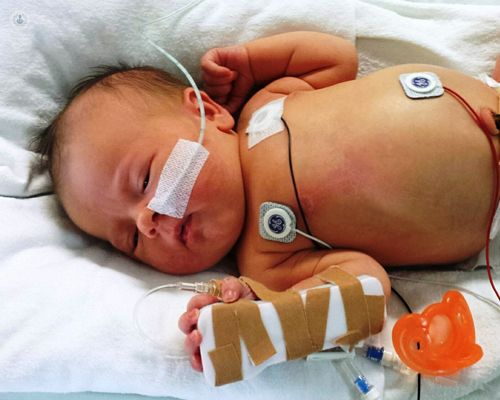Meningitis
Dr Sophie Rosseneu - Paediatrics
Created on: 11-13-2012
Updated on: 06-28-2023
Edited by: Jay Staniland
What is meningitis?
Meningitis is the inflammation of the meninges, which are the protective membranes covering the brain and spinal cord.
There are different types of meningitis but the most common is viral meningitis. It occurs when a virus enters the body through the nose or mouth and travels to the brain.

Bacterial meningitis is rare but can be very serious, even lethal. Although it can be contracted by anybody, it usually affects children and in people who have difficulties in fighting infections.
If you are worried about your child showing symptoms of meningitis, seek assistance from a GP or paediatrician.
How is meningitis spread?
Some types of meningitis don't spread and are non-infectious. It depends on the cause and type, whether meningitis is contagious or not.
Bacterial meningitis
Bacterial meningitis is most often caused by contagious bacteriums Neisseria meningitidis or Streptococcus pneumoniae. Prolonged close contact with a person that's infected may increase risk of transmission. Also, the bacteria can spread by, or through:
- contaminated food
- sneezing
- coughing
- sharing eating utensils
- kissing
- mucus
- saliva
Some people can have meningitis-causing bacteria in their throats or noses, and we can spread it to others. However, this bacteria can't survive outside of the body for long, so it's unlikely you'll catch it from someone who has it.
Viral meningitis
Viral meningitis is the most common type of meningitis. However, it isn't usually life-threatening.
The enteroviruses that cause meningitis can spread through coughing and sneezing, and direct or indirect contact with an infected person increases the risk of catching it.
Non-infectious meningitis
Non-infectious meningitis isn't contagious. It can develop as a result of a head injury, brain surgery or certain medications, lupus or cancer.
Parasitic meningitis
Parasitic meningitis is very rare, but is life threatening. A microscopic amoeba known as Naegleria fowleri enters the body through the nose, usually in contaminated lakes and rivers. However it isn't contagious and you can't catch it by drinking contaminated water.
Fungal meningitis
This is another rare type of meningitis typically caused by a fungus called Cryptococcus, and people with weak immune systems are more at risk of having it. However, it isn't contagious.
What are the symptoms of meningitis?
All types of meningitis are characterised by the presence of a meningeal syndrome, which includes symptoms such as headache, vomiting, high fever, neck stiffness and general feeling of discomfort. These symptoms usually appear three to six days after exposure to the bacteria or virus.
What does a meningitis rash look like?
One of the most specific signs of meningitis is easy to recognise, but meningitis rash can look different for each individual. Also, it progresses at different rates.
There are two different types of meningitis rash:
- Petechial rash
Pin-prick red or purple spots that can resemble flea bites.
- Purpuric rash
Shows up as reddish-purple areas on the skin and looks like bruising.
If either type of rash rapidly evolves, medical help needs to be sought immediately.
It's always important to consider the 'glass test' for meningitis rash. This is where you press a glass or clear surface onto the rash, to distinguish whether it disappears or has developed into a meningitis rash.
What are the causes of meningitis?
Meningitis is usually caused by a viral or bacterial infection, the former being more common and much less serious than bacterial meningitis. Several different types of virus and bacteria can cause meningitis, and they can be spread through coughing, sneezing, kissing, and sharing utensils such as toothbrushes or knives and forks.

What's the difference between viral meningitis and bacterial meningitis?
While the symptoms of viral and bacterial meningitis are similar, such as fever, headache and sensitivity to light, alongside neck stiffness, the rash looks different to bacterial meningitis.
It's important to know the difference between viral and bacterial meningitis, as it will determine how the patient is treated. Antibiotics are essential for bacterial meningitis while they have no effect on viral meningitis.
In order to determine whether a person has bacterial or viral meningitis, a sample of cerebrospinal fluid (CSF) will need to be taken via a lumbar puncture.
Can meningitis be prevented?
Meningitis can be prevented in some cases with vaccines. The haemophilus influenzae type b (Hib) vaccine is used to prevent some forms of bacterial meningitis.
You can also reduce the risk of getting meningitis or spreading viruses and bacteria, by taking several simple actions. These include:
- frequently washing your hands with warm water and soap;
- washing your hands after caring for someone who's sick, after using the toilet, before eating and after changing a nappy;
- avoiding sharing cutlery, straws or plates;
- covering your nose and mouth when coughing or sneezing;
- keeping up to date with meningitis booster shots and immunisations;
- speaking to your doctor if you're travelling to countries that have a higher rate of meningitis.
How is meningitis treated?
Bacterial meningitis can be treated with antibiotics, and patients are kept in hospital in all cases. In viral meningitis, hospitalisation is only necessary in serious cases. In mild cases of viral meningitis, the meningitis generally gets better on its own.
In bacterial meningitis, in addition to antibiotics, oxygen may be provided in cases where the patient is having difficulty breathing. Fluids may be administered intravenously to prevent dehydration, and if there is swelling on the brain, steroid medication may be administered in some cases. Treatment can go on for several weeks.
What are the complications of meningitis?
If you notice symptoms that you think are caused by meningitis, it's very important to get medical help as quickly as possible. While most of the people who have had meningitis make a full recovery, and viral complications are rare, it's estimated that up to one person in every two or three that survive bacterial meningitis can have one or more permanent problems.

The main complications associated with meningitis, are:
- kidney problems
- arthritis, or other bone or joint problems
- amputation of limbs due to stopping the infection spreading the body and remove damaged tissue
- either partial or total vision loss
- behavioural problems and learning difficulties
- co-ordination, movement and problems with balance
- memory and concentration problems
- epilepsy
- hearing loss that's either total or partial
Long-term support and further treatment may be required for these complications.
Which specialist treats meningitis?
Paediatricians are specialist doctors that treat meningitis.
